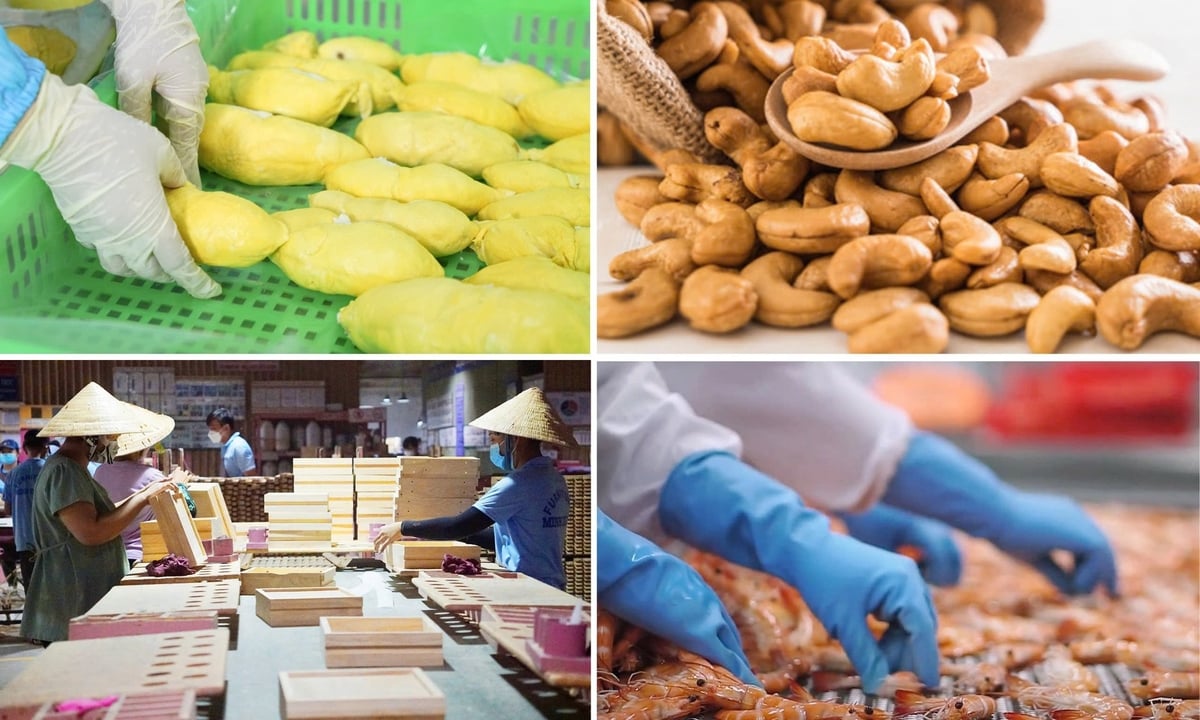December 7, 2025 | 23:48 GMT +7
December 7, 2025 | 23:48 GMT +7
Hotline: 0913.378.918
December 7, 2025 | 23:48 GMT +7
Hotline: 0913.378.918
The U.S. countervailing tariff is the most significant challenge facing Vietnam’s agro-forestry-fishery exports in the final months of the year. For seafood, the situation is pressing. According to To Tuong Lan, Deputy General Secretary of the Vietnam Association of Seafood Exporters and Producers (VASEP), the second half of the year presents “both challenges and hopes.”
The 20% U.S. countervailing duty, effective August 7, risks losing the shrimp market and limiting tuna exports to the U.S. Geopolitical instability and supply chain disruptions further complicate the outlook.

Opportunities are wide open for Vietnam’s agro-forestry-fishery products in many markets. Photo: Nguyen Thuy.
Still, there are growth opportunities. The strong recovery of markets such as China, ASEAN, and Japan, along with signals of reduced technical barriers from the EU, offer room for processed seafood exports to grow. Free trade agreements (FTAs) such as the EVFTA, CPTPP, and UKVFTA continue to provide Vietnam with significant tariff advantages over other exporting nations.
Seafood exports in 2025 are projected to reach USD9 - 9.5 billion, with shrimp accounting for USD3.6–3.8 billion, pangasius USD2 billion, tuna USD850 - 900 million, and other seafood nearly USD3 billion. To reach these targets, businesses must secure raw material supplies, improve quality, invest in processing technology, and diversify markets, particularly niche markets within the CPTPP, ASEAN, and intra-Asian trade.
According to Mr. Truong Xuan Trung, head of the Vietnam Trade Office in the UAE–Qatar, the UAE is not only an attractive consumer market but also a “golden gateway” for Vietnamese agricultural products to penetrate the entire Middle East. Mr. Trung also urged Vietnamese companies to strictly control quality, comply with food safety requirements, provide Arabic labeling, and secure Halal certification.
In the first seven months of 2025, China recorded remarkable growth in seafood imports from Vietnam. In July alone, exports to China reached USD221.5 million, up 31.7% year-on-year, and totaled USD1.33 billion for the seven-month period, a 42.6% increase.
China’s renewed import momentum, especially for shrimp and squid, has allowed Vietnamese exporters to accelerate shipments ahead of the U.S. tariff implementation in August. This success reflects the adaptability of Vietnamese businesses in shifting focus toward high-growth markets while leveraging FTAs like RCEP and CPTPP for tariff benefits.
Vietnam’s Agricultural Counselor to the EU, Tran Van Cong, noted that the EU, despite its stringent quality, food safety, and sustainability requirements, offers vast potential thanks to its annual agricultural imports exceeding USD360 billion and preferential access under agreements such as the EVFTA.
Notably, the EU does not require pre-registration of planting area codes but conducts post-import inspections, facilitating Vietnamese exports of processed fruits and vegetables, processed coffee, eco-certified shrimp, rubber, and wood. Vietnam is also among a select group of countries classified as “low risk” under the EU’s Deforestation Regulation (EUDR), effective late 2025.
To fully capitalize on the EU market, exporters must improve quality, meet green standards, strengthen traceability, secure international certifications, and expand safe farming zones. Authorities, meanwhile, should expedite market access dossiers for livestock products, work toward lifting the “yellow card” on seafood under the IUU regulation, and intensify trade promotion.
Beyond market diversification, many industry associations identify the current value-added tax (VAT) policy on AFF goods as a major bottleneck. The current “pay first, refund later” model strains businesses' capital, hindering raw material purchases and exports.
Do Ha Nam, Chairman of the Vietnam Food Association (VFA), said rice exporters face severe challenges due to upfront VAT payments. From now until year-end, the rice sector alone is expected to pay around VND 2 trillion (USD79 million) in VAT before eventual refunds. Some rice exporters have been waiting for VAT refunds for over a year, with amounts exceeding VND 100 billion (USD3.9 million).
Nguyen Nam Hai, Chairman of the Vietnam Coffee - Cocoa Association, echoed similar concerns. Although coffee exports benefit from record-high prices, over VND 100,000 (USD3.95) per kilogram compared to around VND 40,000 in 2022, the capital needed for export operations has surged.
Since coffee exports this year are expected to reach 1.5 million tonnes valued at USD7.5 billion, exporters must pay an estimated USD375 million (over VND 10 trillion) in VAT upfront. Hai warned that this is adding substantial financial pressure to already capital-strapped businesses.
Translated by Linh Linh

(VAN) At the TARASA25 Conference, participating countries shared experiences on implementing agroecology and regenerative agriculture, contributing to a sustainable transformation of food and agriculture systems.

(VAN) Green industry is becoming a driving force for the development of Hue City, not only promoting economic growth but also protecting the environment, creating the foundation for the Net Zero goal.

(VAN) As of 2025, the ASEAN region has a total of 69 ASEAN Heritage Parks recognized across its 10 member states. Among them, Viet Nam contributes 15 ASEAN Heritage Parks.

(VAN) Yok Don National Park has high biodiversity with numerous endemic plant and animal species, and it is also the only dipterocarp forest ecosystem conservation area in Viet Nam.

(VAN) Viet Nam and Brunei signed two important MOUs on fisheries and IUU, expanding cooperation in agriculture, the environment, and Halal exports, aiming to substantively implement joint projects.

(VAN) The Viet Nam Coconut Association worked with the International Finance Corporation (IFC) and businesses to promote the supply chain, enhance competitiveness, and develop the coconut industry sustainably.
![Hue aims for Net Zero: [2] Pioneering low-emission tourism](https://t.ex-cdn.com/nongnghiepmoitruong.vn/608w/files/huytd/2025/12/04/0633-dulichzero-4-095634_236-161125.jpg)
(VAN) The ancient capital of Hue has developed Net Zero tourism products and models, aiming to reduce carbon emissions and pioneer the establishment of Viet Nam's green tourism destination.